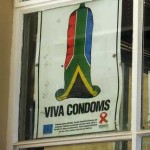South Africa has taken huge strides to get condoms into the hands of soccer-worshipping fans and locals — because a lot of sex is expected during the World Cup.
 But efforts to maximize HIV prevention and AIDS awareness during the games, where many have said over a billion condoms will be needed, may have hit a snag in the most AIDS-ravaged country in the world.
But efforts to maximize HIV prevention and AIDS awareness during the games, where many have said over a billion condoms will be needed, may have hit a snag in the most AIDS-ravaged country in the world.
The AIDS Consortium and other prevention and awareness groups recently accused FIFA, the body governing world soccer, of banning condom distribution and information material at World Cup stadiums and fan parks, according to The Guardian.
The groups added that FIFA was acting hypocritically by allowing alcohol advertising, noting that Budweiser is a corporate sponsor of FIFA.
But FIFA countered the accusations and praised the government’s HIV prevention efforts, according to The Washington Post. FIFA said it would broadcast information about Durex-brand condoms during the matches.
The AIDS groups countered that Durex condoms were far to expensive and out of reach to most South Africans. Hundreds of millions of condoms have been purchased by the government, and many more millions have been donated to South Africa from many nations.
Awareness campaigners have long wanted to use the World Cup as the ultimate venue to raise awareness of HIV/AIDS and condom usage in South Africa and around the world.
Hundreds of thousands are expected to pour into the nation for the month-long event along with over 40,000 prostitutes from around Africa and Europe, according to a Newsdesk report. Alcohol-fueled revelry across the nation is expected to lead to increased sexual encounters.
South Africa has been decimated by HIV/AIDS. About 3 million have already died and about 350,000 are expected to die each year.
The average life expectancy of South Africans has fallen from 65 in 1994 to just under 50 based on 2005 – 2009 estimates, according to The Economist.
In the same time period, the prevalence of HIV/AIDS in 15- to 49-year-old South Africans has risen to nearly 20 percent in some parts of the country.
The disease also disproportionately impacts black South Africans. The Economist report showed 14 percent of blacks were infected versus 1.7 percent of mixed race and 0.3 percent of the white population.
But the government has been getting praise lately for its efforts to stamp out the killer.
President Jacob Zuma launched a program in March to test about a third of the population for HIV by June 2011. It’s an effort to identify HIV-positive men and women in order to supply effective antiretroviral medication and also stem the transmission of HIV from mothers to children.
 But efforts to get out the word about a condom’s effectiveness in stopping HIV transmission in Africa has sometimes come under attack.
But efforts to get out the word about a condom’s effectiveness in stopping HIV transmission in Africa has sometimes come under attack.
On his first trip to Africa in March 2009, Pope Benedict XVI said condom usage increased the problem of HIV transmission. He said marital fidelity and abstinence were the only solution to the problem, according to the BBC.
But others are taking a more proactive attack against HIV/AIDS during this World Cup.
A group of Cape Town hotel owners will be distributing free condoms at their hotels throughout the games in a campaign called “play it safe,” according to news.com.au.
“We thought one of the best places for condom use might just be in the bedrooms,” said Kai Crooks-Chissano, 2010 project manager at the South African Business Coalition on HIV/AIDS. “Good sex is safe sex.”
—Don Clyde/Newsdesk
VIDEO: World cup of safe sex
CITATIONS:
World Cup 2010: Fifa blocking condom distribution at venues, say Aids groups
Guardian.co.uk, June 4, 2010
At World Cup, South African AIDS activists hope to spread word of prevention
The Washington Post, June 9, 2010
Free condoms rolled out for World Cup revellers
news.com.au, June 10, 2010
Condoms at the ready, South Africa prepares for crush of prostitutes
Newsdesk.org, March 29, 2010
Pope tells Africa ‘condoms wrong’
BBC News, March 17, 2009
The Economist print edition, June 5 – 11, 2010
Do billion condoms required not finding enough? cud send some proposal to all those condom company to do some charity for these cause for this occasion from all over the country. and alow them also to put up some advt around field for awareness campaign also.
hello, bow charity home is from nigeria, africa. it is much concern about the health of its people, either whites or blacks.
it noticed there are many diseases in this life which are mostly common in Africa and these diseases are contacted through sex because there are millions on unprotected sex. As a result of these, am much concerned about how to protect unwanted pregnancy and contacting of diseases.
bow charity objectives are to relieve poverty, sickness, HIV, AIDS, cancer, hardship and to provide overseas aid, water, sanitation, free counselling, community law centre, legal advice, debt advice, immigration advice, employment advice, job search advice, translation, welfare advice and benefits for lonely, needy old people, disabled, and underprivileged children and other persons in the Africa
i wish if i could be an help to people around me by helping in distributing of condoms to them because in my environment, condoms are sold which some people can afford it.
i will be glad if i can be connected to you organization and using me as an agent of helping people’s life by distributing condoms, cloths, books, money, shoes, the charity home is also in need of eletronics, car e.t.c.
i wait to read from your organization..
BOW CHARITY
It is important that the education in relation to the use of condoms, are promoted in games like the world cup. it is the simplest way to prevent STI especially HIV.
However just be giving away condoms might not be the best thing but education in itself, even in develop countries, there are problems with teenagers having unprotected sex.
I think spend more money on the education of it would be a good start
It is important to use condoms and practice safe sex, however it is more important to educate about the important of safe sex, if you don’t then the chances for someone to use a condom is minimal.
Education about safe sex takes time and it is important to understand that this is a long term process